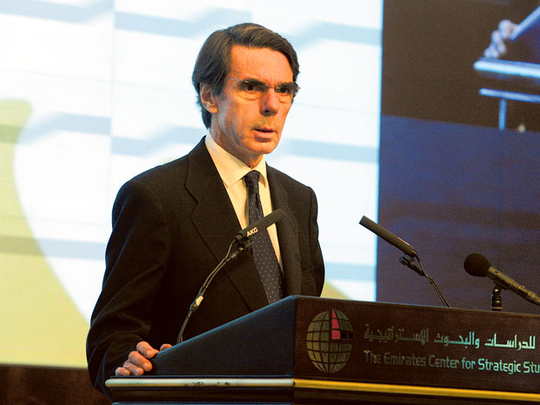
Abu Dhabi: Former president of Spain, Jose Maria Aznar, raised concern about the volatility in the oil market and said that it undermines investment.
Delivering a special address at the end of energy summit in Abu Dhabi, Aznar said stability of energy market is important. “Oil will continue to play a leading role for a long time to come. Security of supply and security of demand is vital,” he said.
Oil prices have been dropping for the past few months due to slowing of economies and oversupply. The US has been able to produce record levels of shale gas as it continues to invest in the energy sector.
From a peak of $115 in June, crude oil has fallen to $78.95 on Wednesday. Analysts have said the trend is likely to continue even next year. According to Goldman Sachs Brent Crude will be as low $80 per barrel in the second quarter of next year.
The Organisation of the Petroleum Exporting Countries (Opec) is due to meet next week to discuss the current situation as pressure grows from members countries to reduce the output to increase the prices.
Aznar said energy landscape requires a more agile diplomacy to guarantee energy security. “Energy security is driven by politics. We need order, clarity and transparency.”
He said energy consumption is growing as population increases. “There is going to be big demand. It is going to increase by 40 per cent in the next two decades. Reliable supply of energy is essential for global growth.”
According to him, global industry needs to overcome many challenges including conflicts in oil producing countries like Syria, Iraq and Libya. “The scope of energy policy has widened and includes environmental and social sustainability. Climate change is a major concern due to carbon emissions.
The two-day conference ended with a discussion on Iran and Ukraine-Russia crisis. Speakers said that an additional oil of 500,000 to 600,000 barrels of oil per day will enter market in the next six to eight months if sanctions on Iran are lifted.
“Iran faces many challenges including lower oil prices. If sanctions are eased, crude oil and natural gas production will expand in the country,” said Dr Sara Vakhshouri, president of US based SVB Energy International.
She said sanctions were a big blow to Iranian oil industry. “Production went down from four million barrels per day to 3.5-3.7 million barrels per day. The country could not reach five year investment plan of $255 due to sanctions.”
Dr Vakhshouri said Iran possesses huge natural gas reserves but the share in the global market is less due to high domestic consumption. “It is trying to gain market share in neighbouring countries like Bharian, Kuwait and the United Arab Emirates by exporting natural gas.”
If the sanctions are lifted, she said international companies will come back to Iran for investment and there will be a price competition on the crude oil front.
Iran is holding negotiations with a group of Western sanctions over its controversial nuclear program. The deadline for reaching an agreement with P5+1 group of countries is November 24.
Speaking on the energy challenges of the Ukraine Crisis, Dr Jack Sharples, an associate professor from the University of St Petersburg in Russia said security of gas transit via Ukraine is a vital issue for European Union (EU)’s energy. “If an interruption to occur in the gas transit, the states of central, southern and south eastern Europe would be affected while the disruption in the western Europe would be minimal,” he said.
According to him, Russia is a strategic supplier of natural gas to the EU and accounts for approximately two-thirds of its imports.
The majority of EU member states currently hold enough gas in storage for at least two months. Bulgaria stands out as being vulnerable with no access to alternative supplies or sufficient gas storage if a disruption to occur.












